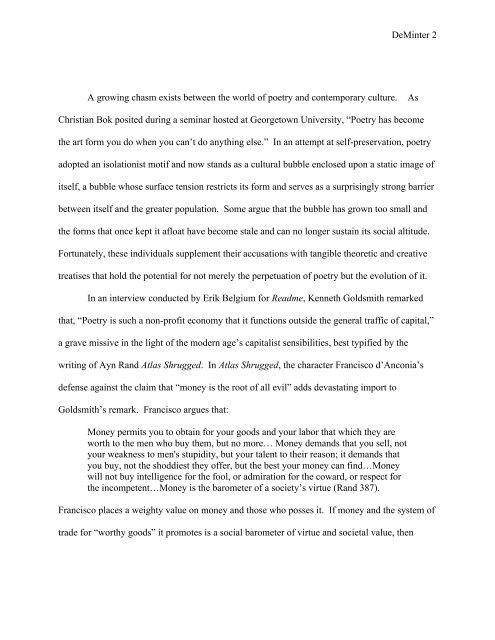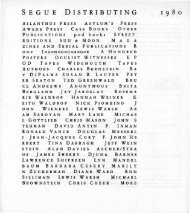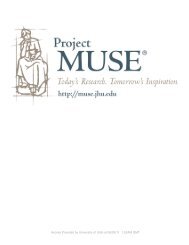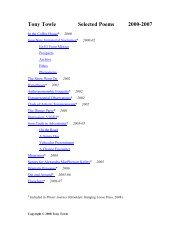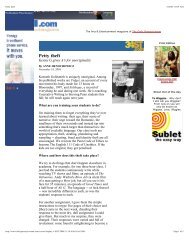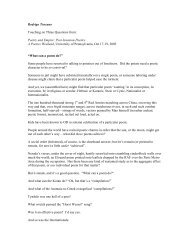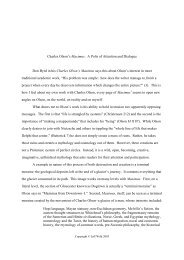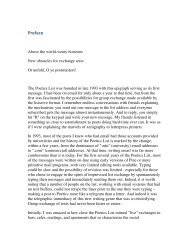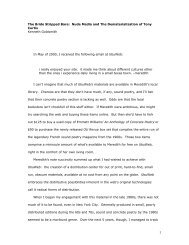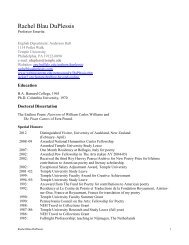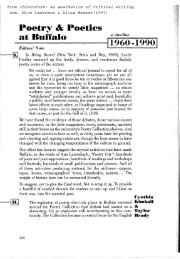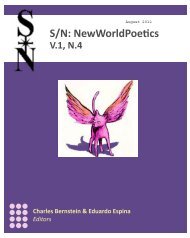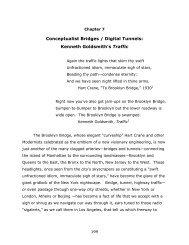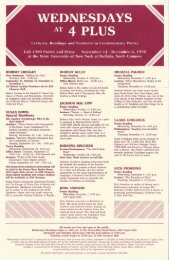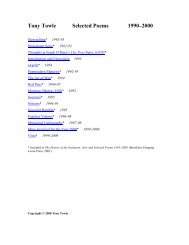P's and Q's of Poetry - Electronic Poetry Center
P's and Q's of Poetry - Electronic Poetry Center
P's and Q's of Poetry - Electronic Poetry Center
You also want an ePaper? Increase the reach of your titles
YUMPU automatically turns print PDFs into web optimized ePapers that Google loves.
DeMinter 2<br />
A growing chasm exists between the world <strong>of</strong> poetry <strong>and</strong> contemporary culture. As<br />
Christian Bok posited during a seminar hosted at Georgetown University, “<strong>Poetry</strong> has become<br />
the art form you do when you can’t do anything else.” In an attempt at self-preservation, poetry<br />
adopted an isolationist motif <strong>and</strong> now st<strong>and</strong>s as a cultural bubble enclosed upon a static image <strong>of</strong><br />
itself, a bubble whose surface tension restricts its form <strong>and</strong> serves as a surprisingly strong barrier<br />
between itself <strong>and</strong> the greater population. Some argue that the bubble has grown too small <strong>and</strong><br />
the forms that once kept it afloat have become stale <strong>and</strong> can no longer sustain its social altitude.<br />
Fortunately, these individuals supplement their accusations with tangible theoretic <strong>and</strong> creative<br />
treatises that hold the potential for not merely the perpetuation <strong>of</strong> poetry but the evolution <strong>of</strong> it.<br />
In an interview conducted by Erik Belgium for Readme, Kenneth Goldsmith remarked<br />
that, “<strong>Poetry</strong> is such a non-pr<strong>of</strong>it economy that it functions outside the general traffic <strong>of</strong> capital,”<br />
a grave missive in the light <strong>of</strong> the modern age’s capitalist sensibilities, best typified by the<br />
writing <strong>of</strong> Ayn R<strong>and</strong> Atlas Shrugged. In Atlas Shrugged, the character Francisco d’Anconia’s<br />
defense against the claim that “money is the root <strong>of</strong> all evil” adds devastating import to<br />
Goldsmith’s remark. Francisco argues that:<br />
Money permits you to obtain for your goods <strong>and</strong> your labor that which they are<br />
worth to the men who buy them, but no more… Money dem<strong>and</strong>s that you sell, not<br />
your weakness to men's stupidity, but your talent to their reason; it dem<strong>and</strong>s that<br />
you buy, not the shoddiest they <strong>of</strong>fer, but the best your money can find…Money<br />
will not buy intelligence for the fool, or admiration for the coward, or respect for<br />
the incompetent…Money is the barometer <strong>of</strong> a society’s virtue (R<strong>and</strong> 387).<br />
Francisco places a weighty value on money <strong>and</strong> those who posses it. If money <strong>and</strong> the system <strong>of</strong><br />
trade for “worthy goods” it promotes is a social barometer <strong>of</strong> virtue <strong>and</strong> societal value, then


